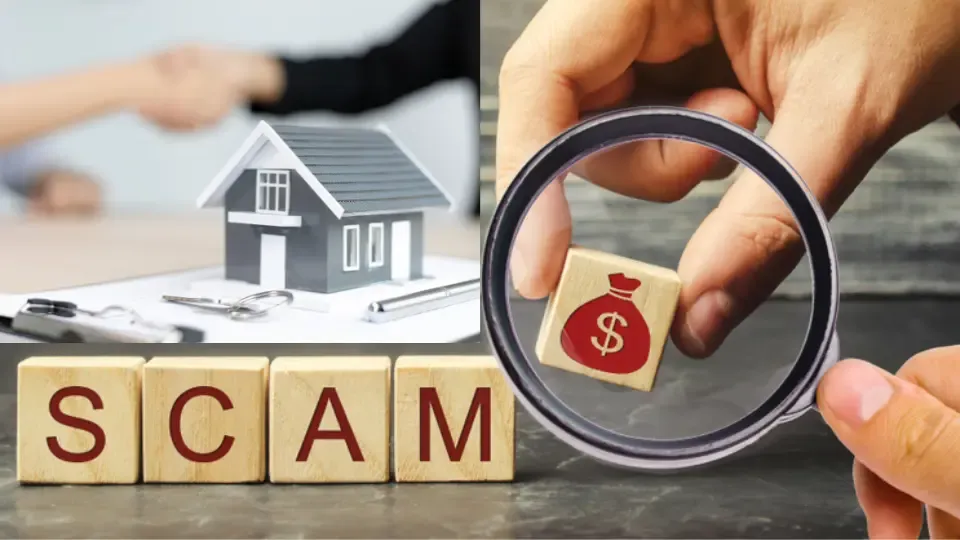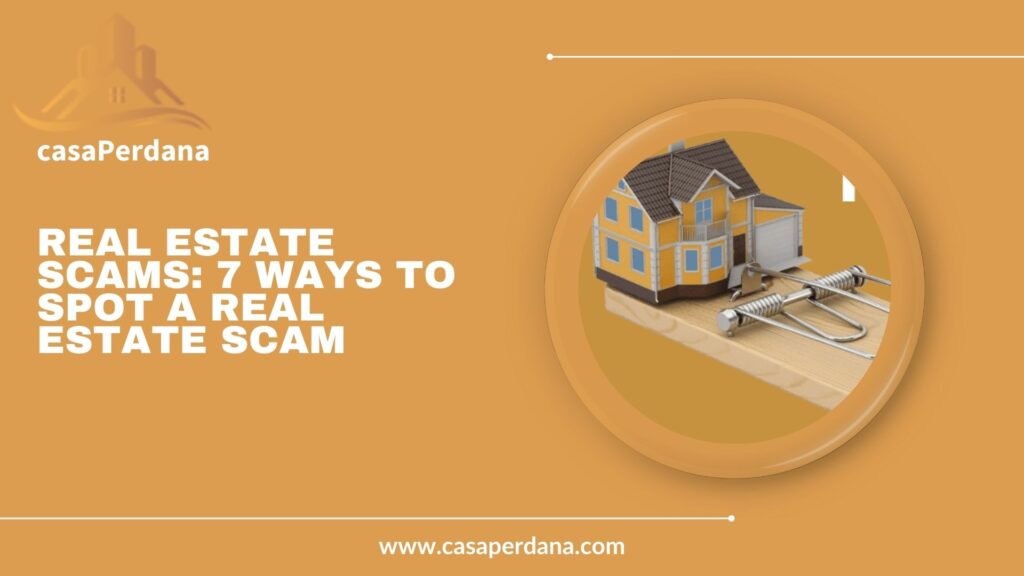Have you been falling into the hands of real estate scammers? Do you want to know how to spot a real estate scam? Keep reading to know the various ways you can spot a real estate scam.

The dream of owning property can quickly turn into a nightmare if you fall victim to a real estate scam. With the rapid growth of the property market, especially in cities like Abuja and Lagos, fraudulent activities are on the rise. Scammers are constantly devising clever ways to deceive unsuspecting buyers and investors, from fake documents to nonexistent properties.
The consequences of falling for a real estate scam can be severe: financial loss, legal battles, and emotional distress. That’s why it’s crucial to stay informed and alert. Knowing how to identify the warning signs of a scam can save you from costly mistakes and protect your investment.
This guide will walk you through the most common red flags in real estate dealings and provide practical tips on how to avoid getting duped. Whether you’re buying land, a home, or working with agents, these insights will help you make safer and smarter decisions in your property journey.
Real Estate Scams: 7 Ways to Spot a Real Estate Scam

Buying property is a major investment and unfortunately, it’s also a target for fraud. Real estate scams are increasing, especially in fast-growing markets like Abuja. Here are seven ways to protect yourself:
1. Unrealistic Prices
If a deal sounds too good to be true, it likely is. Scammers often lure victims by advertising properties at extremely low prices, far below the area’s market value. These “deals” are designed to create urgency and bypass due diligence. Always compare the asking price with similar listings in the same neighborhood.
Consult with local real estate experts to confirm fair market value. Cheap land or homes may end up being fraudulent, disputed, or nonexistent. Never be swayed by price alone. Investigate thoroughly before committing to anything.
2. Lack of Verifiable Documentation
Proper documentation is essential when buying real estate. Every genuine property should have verifiable legal papers such as a Certificate of Occupancy (C of O), Right of Occupancy (R of O), or registered survey plans. Scammers often present fake, forged, or incomplete documents to confuse unsuspecting buyers.
Before making any payment, ask for original copies and confirm their authenticity with the appropriate government agency.
Engage a trusted legal professional or property consultant to review all documents. If the seller refuses or gives excuses, walk away immediately. No paperwork, no deal.
3. High-Pressure Sales Tactics
Scammers rely on urgency to trap their victims. You may hear phrases like “This deal won’t last,” “Someone else is interested,” or “Pay now to reserve the property.”
These are red flags. Legitimate real estate transactions take time for verification, inspection, and negotiation. Anyone who pressures you to act quickly is likely trying to bypass your due diligence process.
Don’t be intimidated by aggressive sales tactics. Take the time you need to verify documents, visit the site, and consult professionals. Buying property is a big step, never rush it based on pressure.
4. No Physical Access to the Property
If a seller refuses to let you see or inspect the property in person, consider it a serious warning sign. Many scams involve fake listings or non-existent land.
A legitimate seller should provide full access for inspection, along with clear directions to the property. When visiting, examine the boundaries, road accessibility, nearby landmarks, and overall condition. Bring a registered surveyor or estate agent to assess the land’s legitimacy.
Never pay for a property you haven’t physically seen. Photos or verbal descriptions are not enough, verify with your own eyes.
5. Fake or Unregistered Agents
Not everyone claiming to be a real estate agent is legitimate. Scammers often pose as agents without any professional background or registration. Always ask to see their valid license or proof of registration with a recognized real estate association.
Research their name online, read reviews, and ask for referrals from trusted individuals. You can also verify them with the local land registry or regulatory bodies.
Avoid roadside agents or those who refuse to disclose their office location or identity. Professional agents are transparent and traceable.
6. Vague or Changing Information
Scammers tend to be inconsistent. They may change the property’s location, size, price, or ownership details during conversations. This is a major red flag. A genuine seller or agent should have clear, consistent, and documented information about the property.
If you notice shifting stories, avoid proceeding. Ask for all relevant details in writing, including plot number, survey plan, ownership name, and legal title.
Inconsistencies usually indicate that the property either does not exist or has legal issues. Don’t rely on word-of-mouth, demand clarity and documentation.
7. No Receipt or Written Agreement
Never pay for a property without a signed written agreement and official receipt. Scammers often insist on cash transactions with no documentation, making it impossible to trace or reclaim your money.
Every transaction should be supported by a legal sales agreement, signed by both parties and ideally reviewed by a lawyer. Receipts should clearly state the amount paid, purpose, date, and seller’s information.
These documents protect your legal rights and serve as proof of transaction. If a seller refuses written documentation, it’s best to walk away.
In conclusion, real estate scams can happen to anyone, but being informed is your best defense. Always conduct thorough research, verify all documents, and involve professionals at every stage.
Don’t rush into deals, no matter how attractive they seem. If anything feels off, it probably is. Protect your money, your peace of mind, and your future by staying alert and making informed decisions.
Frequently Asked Questions

1. What Are Common Signs of a Real Estate Scam?
Common signs include extremely low prices, lack of verifiable documents, refusal to allow property inspections, unregistered agents, pressure to pay quickly, vague information, and no written agreements or receipts.
2. Why Does an Unrealistically Cheap Property Offer a Red Flag?
Scammers often use very low prices to lure buyers. If the offer is far below market value, it’s likely a scam. Always compare prices with other similar properties in the area.
3. How Can I Verify Property Documents in Nigeria?
You can verify documents like the Certificate of Occupancy (C of O) or Right of Occupancy (R of O) through the Abuja Geographic Information Systems (AGIS) or the local land registry. Always consult a property lawyer.
4. What Should I Do if an Agent Refuses to Show the Property?
Walk away. Any genuine seller or agent should allow a physical inspection. Refusal is a major red flag indicating that the property might not exist or has issues.
5. Are Unregistered Real Estate Agents a Risk?
Yes. Always work with registered and licensed agents. Ask for their identification, registration details, and check their reputation online or through referrals.
6. Can Real Estate Scams Be Reported?
Absolutely. Report scams to the Economic and Financial Crimes Commission (EFCC), the police, or local real estate regulatory authorities. Provide all evidence to support your claim.
7. How Important is a Written Agreement When Buying Land or Property?
Extremely important. A written, signed agreement protects your legal rights and documents the transaction. Always involve a lawyer in drafting or reviewing the agreement.
8. Should I Make Payments in Cash?
Avoid cash payments. Always use traceable payment methods like bank transfers and ensure you get an official receipt for every payment.
9. What Professionals Should I Involve to Stay Protected?
Work with a real estate lawyer, registered surveyor, and a licensed agent. Their expertise will help you avoid costly mistakes and identify scams early.
10. What Should I Do if I Suspect a Real Estate Scam?
Stop all communication immediately, gather all evidence (messages, receipts, photos), and report to the relevant authorities. Don’t attempt to confront the scammer alone.
Related Post:




